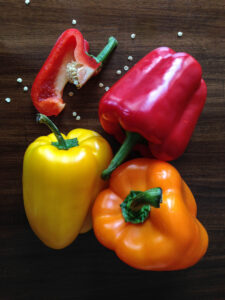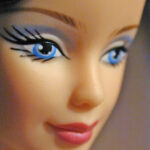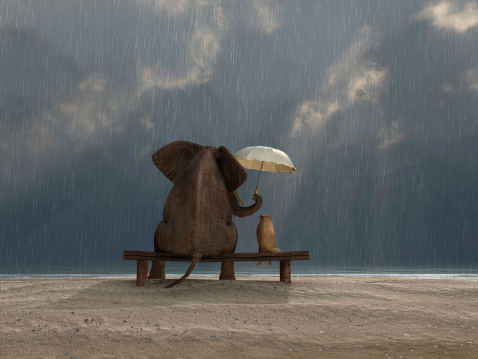SUMMER PEPPERS

I was chopping the peppers when Elvis pulled me back to San Antonio. In my ears swam his warm honey voice, then the music of children playing, splashing. Sunlight made love to the pool water, blurring everything in glittering yellow tones. In this golden light, rules didn’t matter. Little boys ran, jumped, flew, carried by the breeze, and I watched with elation and jealousy from under my umbrella. Their wet feet slapped harmoniously against the same concrete that scratched my butt through my swim trunks.
Elvis sang, you should’ve heard those knocked-out jailbirds sing, and Mom hummed along at my back. She lounged, magazine in hand. Her sunglasses were bigger than the world, and shinier, too. Her hat was bigger still, with a brim on which stray birds might make a home for the summer. This image of her was like something out of a movie. She pulled her eyes from the gossip pages to attend to me, and she smiled with her mouth closed tight. “Why don’t you go play with the other boys?” she asked (begged), and suddenly my feet became very interesting and I had to look at them. Elvis implored us to rock, everybody let’s rock, and Mom sighed. I was watching the other boys move, dance, and rock, when I saw him.
He had a body like the statues you’d find in an art museum, godly and beautiful. He glowed. I can see him now, blond and tan and dimpled, with long legs descending out of his lifeguard trunks. I couldn’t watch the other boys anymore, because light cascaded from this man and into my chest and I was enamored. When he smiled, the sky exploded, taking me with it. I was reverent. Elvis sang, you’re the cutest jailbird I ever did see, and the boys rocked, but I didn’t notice. The lifeguard was ephemeral and flickering as a flame. A king in his tall white throne, unaware of my unwavering gaze. I was still, devout.
Then a sound from the shade behind me, a tut of resounding disapproval, yanked me. I turned, and Mom sighed, and there was a moment of the worst kind of understanding. I could see her eyes through her sunglasses and oh, she knows, she knows. The birds in her big hat chirped, oh, they know, they know. The other boys had stopped rocking and they stared with wide eyes, they know. The beautiful man, up on his heavenly precipice, bore down on me with disgust. He knows. I pulled myself deep into the shade of the umbrella, away from the golden light that stripped away my shell, and laid bare the twisted little fluttering thing underneath. They know. They know. They know. Elvis sang, sad sack was sitting on a block of stone, way over in the corner weeping all alone. A slip of the fingers, and then a slice, sharp inhale. I was bleeding. I’d long finished chopping the peppers.







